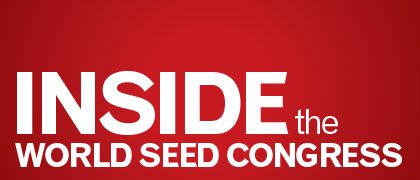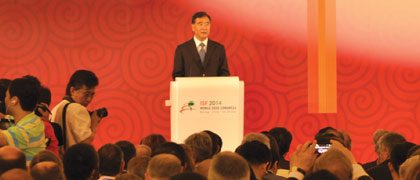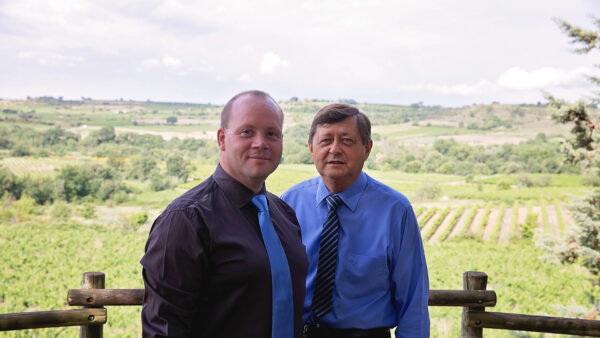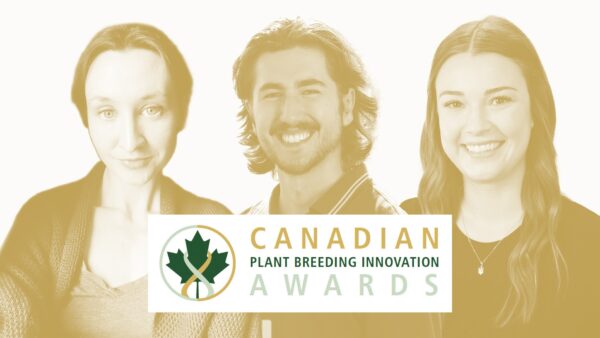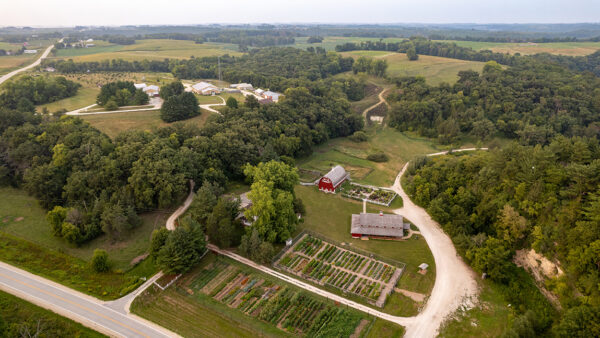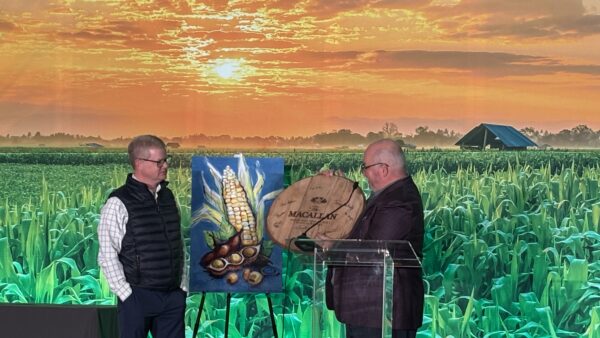Beijing played home to the global seed industry as delegates worked to eliminate trade barriers and promote the international movement of seed.
Delegates of the International Seed Federation’s 2014 World Seed Congress made progress on a number of fronts, including positions on low-level presence, international treaties and an international standard on the movement of seed. They also elected new leadership.
The general assembly unanimously elected Alvaro Eyzaguirre from Chile as president. Eyzaguirre is the first ISF president from South America. During his acceptance speech, he outlined “the need for a strong collaboration between the seed industry, farmers, governments, associations, non-governmental organizations and universities to respond to the unprecedented challenges of increasing food production and climate change.”
In the face of an increasingly regulated environment, Eyzaguirre urged delegates to work together within ISF to enhance the image of the seed industry.
At the opening of the 2014 World Seed Congress, Wang Yang, vice premier of the People’s Republic of China welcomed more than 1,300 delegates from more than 60 countries.
The Business of Seed
One of the first meetings was the Breeders Committee, which focused on international treaties. During the meeting, leadership discussed access and benefits sharing, international agreements and the adoption of a position paper on the implementation of national policies for low-level presence, which was approved during the general assembly. The paper stresses the importance of science-based, practical and transparent LLP policies that governments should adopt.
Anke van den Hurk, who serves as the chair for the ISF’s Sustainable Ag Committee, led the discussion on international agreements and access and benefit sharing.
The Nagoya Protocol, which is an international agreement that was adopted by the Convention on Biological Diversity in 2010 that aims to share the benefits arising from the utilization of genetic resources in a fair and equitable way, has 37 countries ratified, van den Hurk reported. The protocol must have 50 ratifications before it can be entered into force. The committee expects to reach the 50 mark in 2014/15.
As part of the discussion on international agreements, the International Treaty on Plant Genetic Resources for Food and Agriculture was highlighted. The Nagoya Protocol and the ITPGRFA focus on conserving genetic resources, sustainably using genetic resources, and access and fair and equitable benefit sharing. It’s reported that the European Union is a member of both the Nagoya Protocol and the ITPGRFA, while South Africa is only a member of the Nagoya Protocol. India is a member of both, but the two are not harmonized. Meanwhile, Japan is considering the Nagoya Protocol and studying EU’s implementation of the agreement.
But it was noted that plant breeders prefer the ITPGRFA to the Nagoya Protocol because it’s simple. The ITPGRFA is one contract that recognizes breeders’ exemption with limited administration. However, to date, it has limited implementation, limited inclusion in the multi-lateral system and limited money in the benefit-sharing fund.
To address these concerns, ISF looks to develop a system that is simple and inclusive. The organization is considering what a level playing field would look like — something that’s proportional to all users. They are also developing criteria on how the benefit sharing funds could be spent.
ISPM Advances
The International Plant Protection Convention (IPPC) approved a draft of the International Standards to Phytosanitary Measures (ISPM), specific to the international movement of seed. Country consultations started in July and approval by IPPC members is expected in April 2015, to be followed by country implementation from 2016 to 2018.
ISPM for seed is a major step forward, said Gerard Meijerink, ISF Phytosanitary Committee member, noting that it’s only the first step of many. The seed industry will play a pivotal role in helping others fully understand the ISPM and why it’s needed.
The ISPM is designed to do four things. It will provide guidance to countries to prevent entry, establishment and spread of regulated pests associated with seeds. It will assess and manage the pest risks associated with the international movement of seeds. It will promote the harmonized import requirements, testing and diagnostic protocols. And it will promote the use of import requirements and phystosanitary certification systems that are better suited for seeds.
Seed Applied Technologies
One of the last meetings of the congress was the Seed Applied Technologies Committee. It was reported that four documents — Guidelines on Labeling Treated Seeds, Industry Guidelines for Disposal of Seed Treated with Plant Protection Products, Seed Treatment Operator Safety Guidelines and Good Use Practice — had been completed and will be available online at worldseed.org.
The Guidelines on Labeling Treated Seed outlines the broader issues to consider, information required by regulation and/or label and the minimum information needed on the label.
The Industry Guidelines for Disposal of Seed Treated with Plant Protection Products addresses concepts for minimizing the disposal of treated seed, various disposal processes and disposal verification. It also outlines what is not considered to be proper disposal.
Seed Treatment Operator Safety Guidelines provides recommendations for properly trained personnel, standardized and controlled processes, appropriate assets such as equipment and facilities, and worker safety programs.
Good Use Practice Guidelines spotlight the role of primary stakeholders, including suppliers, applicators, seed sellers, distributors and farmers. It also highlights state-of-the art treating facilities, technical components and educational goals that comprise them. Principles outlined in the guidelines need to be implemented for proper use and stewardship of the technology.
The Technology Sub-Committee reported that it had begun to compile information to create additional guidelines, identifying criteria of quality treated seed and highlighting the benefits of seed applied technologies to help foster a positive environment.
The Regulatory Sub-Committee, which focuses on three work streams, followed the Technology Sub-Committee report. Biologicals, minor use work stream and import/export regulations of treated seed are the three focus areas.
Individuals involved in the biologicals work stream are harnessing efforts to share experiences on biological activities, establish beneficial associations, implement integrated pest management strategies, harmonize regulatory approval and deploy safe stewardship of the technology.
Individuals involved in the minor use work stream are working to improve the accessibility of tools to control diseases, collect information on activities and release a position paper.
Individuals involved in the import/export regulations of treated seed are focused on transparency. They are identifying regulations and assisting with legal compliance issues.
Additionally, the Communications Sub-Committee reported that it’s trying to improve peanut and sorghum seed quality by assisting in areas that experience significant production issues due to disease in South Africa. In coordination with the Getz Foundation, the Communications Sub-Committee seeks to establish better producer practices. The sub-committee put forth a funding proposal that will enable the first step in building a seed industry in Africa.
The group is also identifying resources to help improve internal and external communications with me
mbers, regional organizations and stakeholders.
The International Seed Federation welcomed Michael Keller as secretary general.
Meet Michael Keller
Last but not least, ISF has hired Michael Keller as its secretary general. Keller comes to ISF from DuPont, where he started with Pioneer, but has since acquired extensive experience in crop protection, food and feed issues and renewable resources.
“Michael has proven capacity-building abilities and determination,” said Tim Johnson, former ISF president. “With a strong track record and more than 15 years of experience, he understands public policy, regulatory frameworks and public affairs. Through Michael’s work with the national seed union, he has created cohesion and obtained consensus among members.”
Keller’s native language is German, but he is also fluent in English and French. Keller believes in continuing education and is a life-long student. His education reflects this with a bachelor’s in law from the University of Manheim, a Post-graduate diploma in political science, a master’s in European law and a cycle of post-graduate European studies.
Keller started his career working for the French Senate and then had a leading role in the Mayors Association. He represented constituents’ interests at the European level and regularly interacted with the Organisation for Economic Co-operation and Development, the Food and Agriculture Organization and the World Bank.
“I look forward to moving the industry forward and doing what’s best for all ISF members,” Keller said, noting that he plans to focus on the commonalities among members to help build a positive image for the seed industry.
Lorena Pahl and Julie Deering


